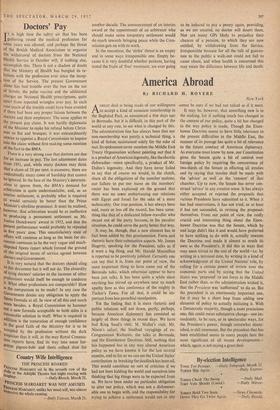Doctors' Pay
IT is high time the sultry air that has been gathering round the medical profession for some years was cleared; and perhaps the threat of the British Medical Association to organise the withdrawal of doctors from the National Health Service in October will, if nothing else, accomplish this. There is not a shadow of doubt that the Ministry of Health has bungled its re- lations with the profession ever since the incep- tion of the Service. The present Government alone has had trouble over the ban on the use of heroin, the polio vaccine and the additional charges on National Health prescriptions, quite apart from repeated wrangles over pay. In each case much of the trouble could have been avoided if there had been any proper liaison between the doctors and their employers. The same applies to the present pay claim. It was hardly diplomatic Of the Minister to make his refusal before Christ- mas so flat and brusque; it was extraordinarily unwise to appoint a Royal Commission to inquire into the claim without first making some mention of the fact to the BMA.
There is a very strong case that doctors are due for an increase in pay. The last adjustment dates from 1951, and, while many doctors may think that a claim of 24 per cent. is excessive, there are undoubtedly many cases of hardship that cannot be ignored. In the face of the Ministry's determin- ation to ignore them, the BMA's demand for arbitration is quite understandable, and, as an interim settlement, is probably what is required (it would certainly be better than the Prime Minister's sibylline promises). It must be realised, however, that arbitration would be as ineffective in producing a permanent settlement as Mr. Justice Danckwerts' award in 1952, and that the present performance would probably be repeated in five years', time. This unsatisfactory state of affairs will continue as long as the basis for dis- cussion continues to be the very vague and much- disputed Spens report which formed the ground of the original terms of service agreed between doctors and Government.
It is very natural that the doctors should cling to this document but it will not do. The absurdity Of tying doctors' salaries to the incomes of other professions would itself be enough to condemn it. What other professions are comparable? How is the comparison to be made? In any case the Government denies any obligation to apply the Spens formula at all. In view of all this and much More besides, a Royal Commission to hammer out a new formula acceptable to both sides is a reasonable solution in itself. What is required in addition is the restoration of enough confidence in the' good faith of the Ministry for it to be accepted by the profession without the dark suspicion that it will, in the way Royal Commis- sion reports have, find its way into some for- gotten pigeon-hole and there collect dust for another decade. The announcement of an interim award or the appointment of an arbitrator who should make some temporary settlement would do much towards bringing peace while the Com- mission gets on with its work.
In the meantime, the 'strike' threat is an empty and in some ways irresponsible one. Empty be- cause it is very doubtful whether patients, having tasted the fruits of 'free' treatment, are ever going to be induced to pay a penny again, providing, as we are assured, no doctor will desert them. Nor are many GPs likely to prejudice their chances of a pension, to which they are now entitled, by withdrawing from the Service. Irresponsible because for all the talk of guaran- tees to the public a walk-out could not fail to cause chaos, and when health is concerned this may mean the difference between life and death.


































 Previous page
Previous page